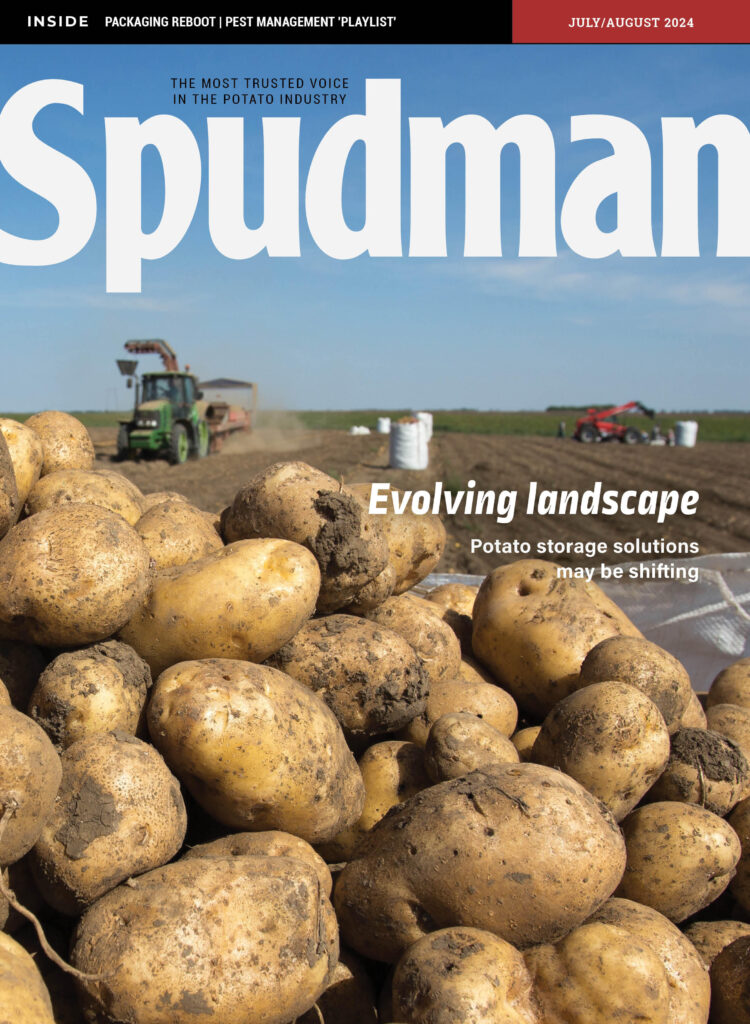Selecting A Source: Look into Farm’s History Before Choosing a Seed Provider
When growers are looking for a seed potato provider, there are some things they must each consider first, said Phillip Nolte, Extension seed potato specialist at the University of Idaho in Idaho Falls.
The first thing to look at when selecting seed is the seed grower.
Philosophically speaking, there is a big difference between producing potatoes for commercial consumption and for seed,” Nolte said. “There’s an awful lot of things seed producers have to worry about the seed producer really has to pay attention to a lot of important details.”
When buying seed, a grower should visit the seed farm and talk with the seed grower. Nolte said there’s a lot that can be discovered when seeing a farm first-hand.
“Seed producers need to operate by a different set of standards than the commercial people,” he said. “You want people who are committed and well organized and detail oriented that’s what seed producing is all about.”
When visiting the seed farm, if a grower notices cull piles around the farm and disorganization, the grower should probably take his business elsewhere.
“Cleanliness is next to godliness in seed growing,” Nolte said.
Growers should be aware of their seed providers’ certification records to make sure the seed they are
buying is as clean as it can be.
In states that require certification, seed potatoes go through a series of in-field and grow-out inspections that look for things such as bacterial ring rot, potato leafroll virus and potato mosaic virus.
“Summer inspections will let growers know what was in the seed when it was planted, but they fall short of letting the grower know what happened during the growing season as far as those viruses were concerned, Nolte said. “This is why winter grow-out is important.”
Certifying agencies plant these seed potatoes in warm climates such as California and Hawaii.
“All that is done because any virus infections that occur during the growing season should show up when you grow these plants out,” Nolte said.
In addition to these in-field inspections and winter grow-outs, most certifying agencies also require inspections at the shipping point.
“We need to be very adamant about it and insist that the seed you purchase as a commercial potato producer receives a shipping-point inspection on a per-load basis,” Nolte said. “It is the last look at the seed for any kind of internal problems, which could reveal internal rot, leafroll virus, any of the necrotic viruses and other things like nematodes, for instance.
During these shipping-point inspections, inspectors will pull tuber samples from every truck that leaves. They cut the tubers and inspect them , inside and out for defects.
“That shipping-point inspection is that final protection for you as a commercial producer to make sure that seed doesn’t have something you don’t want,” Nolte said.
Not every state requires the same inspections or the same process. In fact, not every state requires that seed potatoes be certified. That’s why it’s important for growers buying the seed to make sure they know as much as they can about where their seed is coming from.
“You don’t have to be in the dark about the seed lot that you purchase,” Nolte said.
Growers can request a plant health certificate from their seed providers that is provided by a certifying agency. This certificate contains detailed information about the farm where the seed is planted as well as information about that seed lot.
“This (certificate) might help you make that decision if you want this seed it’s just one more level of protection,” Nolte said.
To view a copy of this plant health certificate, visit www.umaine.edu/paa and select “Certification.”
Even growers who have long-standing relationships with their seed providers should make sure they know as much as they can about the farm. And when looking for a new provider word of mouth, buyers’ guides and seed-source listings all can lead to seed providers.
But, Nolte advised, “Shopping around for the cheapest price on seed may be a good way to buy problems.”







